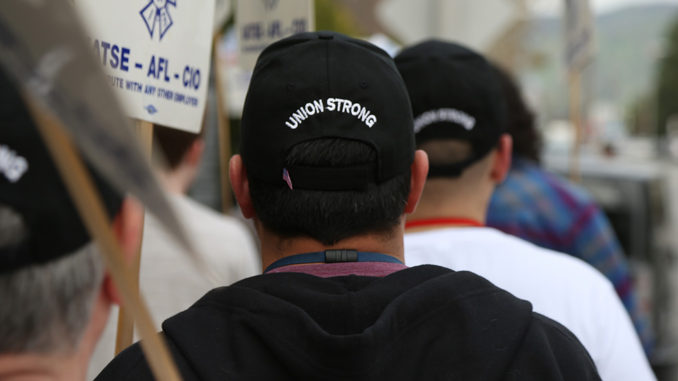by Rob Callahan

Rob Callahan.
In late November, soon after the death of Marvin Miller, the longtime executive director of the Major League Baseball Players Association, I handed an editor a check. These two events — Miller’s death and the editor’s payment — were unconnected to one another, except to the extent that the editor’s remarks upon receipt of the money served to remind me of the lessons we might still learn from the recently deceased union man.
Let us start with the editor, whom I’ll call Ray. Ray is a successful picture editor with a lengthy list of unscripted television credits. Months previously, one of Ray’s erstwhile employers (the producer of a signatory show) had attempted to dodge its contractual obligations by claiming that the show’s editors and assistants were actually the employees of another company. In effect, the company had used deceptive accounting and a sham subcontract to pay assistant editors well below scale, and to avoid paying health and retirement benefits and holiday and vacation pay for the entire crew.
The Guild, of course, sought to remedy this breach of contract. After many months of wrangling, we secured a settlement in which the company made benefit contributions retroactively and surrendered a sum of cash as compensation for its underpayment of wages. (A similar situation on another unscripted TV show last summer was resolved more speedily when that show’s entire post crew walked off the job in order to secure their benefits under the contract.) For Ray, his share of the settlement money, amounting to about a day and a half of pay, was a windfall. He had completed the job in question several months prior to our meeting, and he hadn’t expected any additional compensation.
Ray was happy to receive the unanticipated check, but he also voiced some unease. He confessed that he felt somewhat guilty accepting his portion of the settlement. After all, he had entered into an agreement with the company to work for a set rate, on a non-union basis, and the company had paid him accordingly. Ray didn’t believe that his former employer owed him anything more, and he wondered aloud whether it was honorable to accept additional payment. This employer, for whom Ray had worked off and on over the years, had always done right by him, Ray thought, and he felt it potentially unprincipled and ungrateful for him to take more than what he had individually negotiated.
I explained to Ray that he had no cause for misgivings. His personal deal memo notwithstanding, the company had entered into an agreement with the union to provide certain benefits and working conditions to the entire crew, and then the company engaged in fraud to shirk its commitments. Any dishonor belonged solely to the employer.
Marvin Miller taught players to regard the relationship of team owners to players not as one of benefactors to beneficiaries, but as one of capital to labor.
Ray eventually came around to seeing the situation as I explained it to him. At any rate, he at least took the money. But the misgivings he initially expressed were not uniquely his; in the course of organizing to win union contracts, and in the course of enforcing contracts where they already exist, I have often heard professional employees fret about whether it is fair to an employer for employees to try to improve upon established terms of employment. Underlying such misgivings is often the implicit idea of one’s employer as a benefactor, and of any challenge to such a benefactor as constituting a betrayal. This sentiment can sometimes be so strong that an otherwise sensible and self-respecting editor is reluctant to accept retroactive pay from an employer who had shamelessly cheated him and his colleagues.
I met with Ray only days after the death of MLBPA’s Miller. Because labor leaders are seldom widely eulogized in the media, I had been reading a number of articles about Miller’s life. Ray’s attitude towards his employment reminded me of what I had read about the baseball players’ union at the time Miller took charge.
Before going to work for the Players Association in 1966, Miller had extensive experience with more traditional labor unions, most notably the United Steelworkers. The organization Miller encountered when he came to the MLBPA, though, did not much resemble the unions he had previously known. The Association was dominated by the team owners and did not engage in actual collective bargaining. Due to the reserve clause in their contracts, players forever forfeited their right to work for any teams other than those that originally signed them, thus effectively surrendering all bargaining power to their employers.
Miller found an attitude of paternalism shaping the owners’ dealings with their players. Many players, competitive on the diamond but docile at the negotiating table, were loathe to challenge that culture. For young men who had spent their boyhoods dreaming of playing in the major leagues, a baseball player’s life and salary represented the stuff of fantasies. The team owners, who had given those young men the opportunity to live their dreams, were widely regarded as benevolent father figures worthy of gratitude and obedience.
I have often heard professional employees fret about whether it is fair to an employer for employees to try to improve upon established terms of employment.
Years later, Marvin Miller would assert, “Major league players, at the time, were truly brainwashed.” A pool of individuals of extraordinary talents that had generated great wealth for their employers had come to feel indebted and indentured to the very organizations for which they amassed extravagant profits. Players thought of their employment not in terms of their economic value to their employers, but instead from a perspective more akin to that of artists in the patronage system, under which talented people depended upon the largess of wealthy benefactors, whose role was to recognize and encourage the exercise of their talents. (Prior to the relatively recent emergence of sophisticated systems for the commodification of mass culture, systems of patronage largely defined the economics of arts and entertainment.)
Malcolm Gladwell, in a New Yorker article about Miller two years ago, wrote, “Miller’s goal was to get his ballplayers to think like steelworkers — to persuade members of the professional class to learn from members of the working class.” He taught players to regard the relationship of team owners to players not as one of benefactors to beneficiaries, but as one of capital to labor. And he taught them the central, simple lesson of the union movement: In the relationship between labor and capital, employees enjoy much greater bargaining power acting in concert than they do individually.
Not coincidentally, players prospered under Miller’s tenure at the MBPLA; average salaries increased more than twelvefold, players won release from the reserve clause, and pensions improved dramatically. I refer interested readers to the wealth of material that has been written about how Miller’s MBPLA transformed the sport and the clout of professional athletes more generally.
Of course, the world of professional athletics is not the only professional culture that emphasizes individual talent and allegiance to patrons. Hopefully the example of the MLBPA can help teach us that talented individuals fortunate enough to be working their dream jobs still can — and should — band together and fight to make those jobs better.


